This post may contain affiliate links. For more information, read my disclosure policy.
There is little in the world I like more than a warm slice of French Bread. This post is going to teach you how to make French Bread at home so you can enjoy it every time a craving hits. It’s the BEST one I’ve tried!! You WILL be able to make your own bread when you’re done reading this!
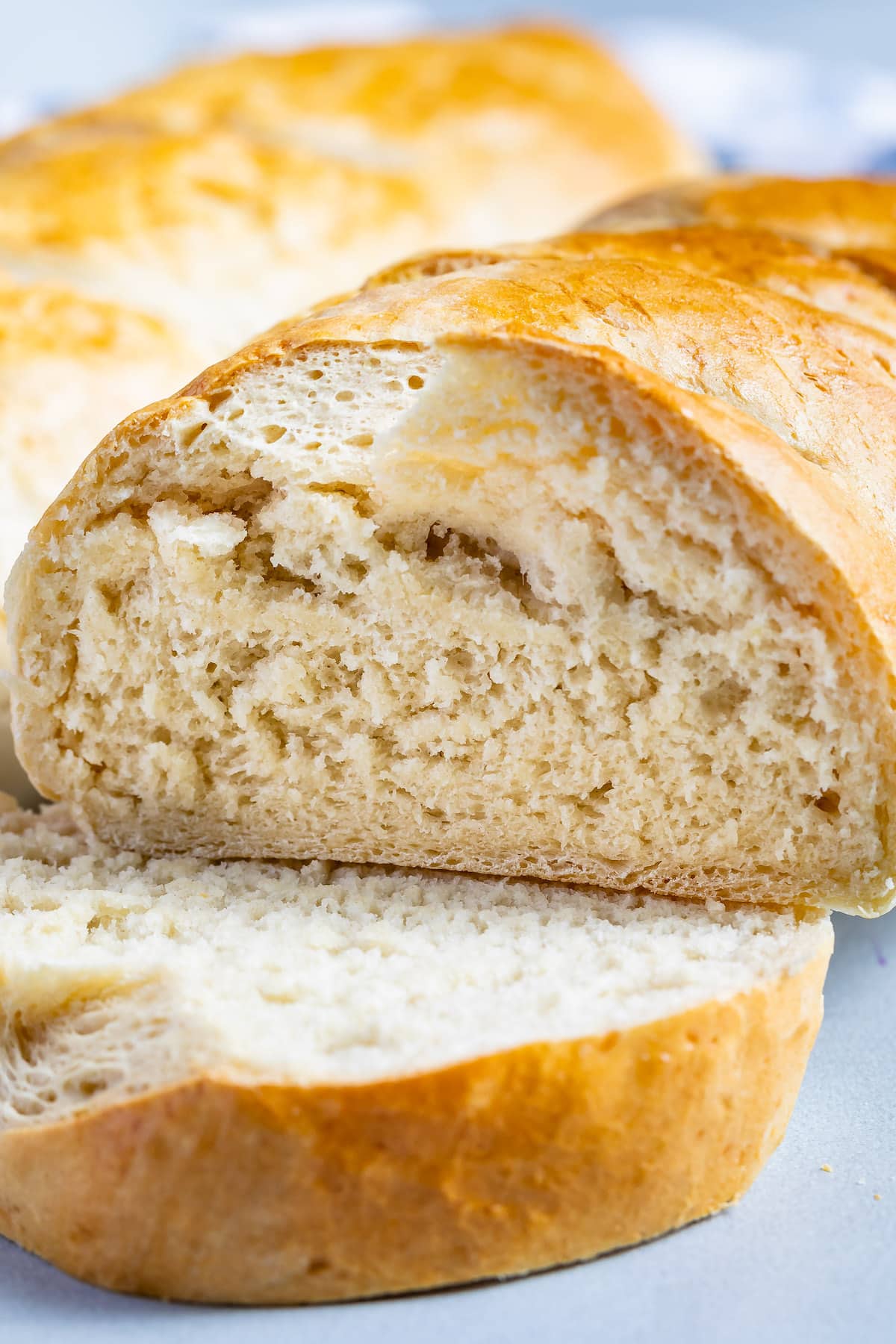
The BEST French Bread Recipe
If I had to choose between dessert and bread and only eat one for the rest of my life, I’d have a huge struggle. Often, a nice thick slice of bread with butter IS my dessert!
I’m an equal opportunity bread lover: I like sandwich bread, dinner rolls, wheat bread, sourdough, French bread…you name it I love it. I know it’s easy to buy bread but making easy french bread is, well, easy! I love making bread and today I’m going to teach you how to make your own.
I absolutely love this recipe – it’s perfect for making garlic bread, French bread pizza, or just eating plain. You CAN make French bread at home – I promise!
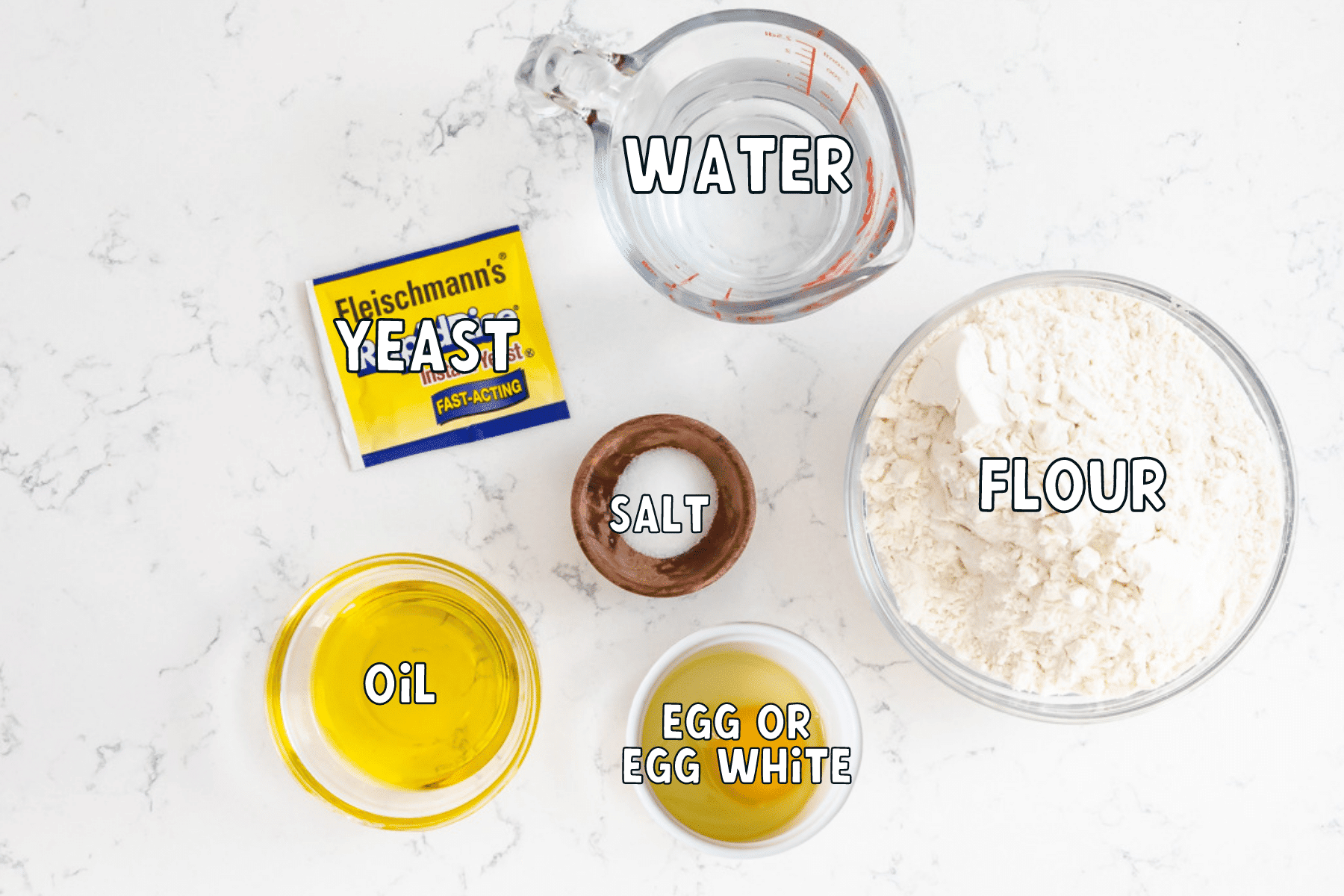
French Bread Ingredients
- All-purpose flour: The recipe calls for All-Purpose flour, and I always recommend using what the recipe calls for, but in a pinch you can substitute bread flour 1:1. The shape and consistency of the loaves might be different, but in a pinch you can sub it.
- Rapid Rise (Instant) Yeast: My preferred yeast is Instant Yeast (I use Fleischmann’s Rapid Rise Yeast) because it cuts out half the rising time in bread recipes. Almost all yeast brands have an Instant Yeast, but they’re sold under different names (all will say “instant” somewhere on the package). If you can only find Active Dry Yeast, see the note in the recipe.
- Oil: breads need fat to be moist and flavorful
- An egg or egg white (for the egg wash)
How to make Homemade French Bread
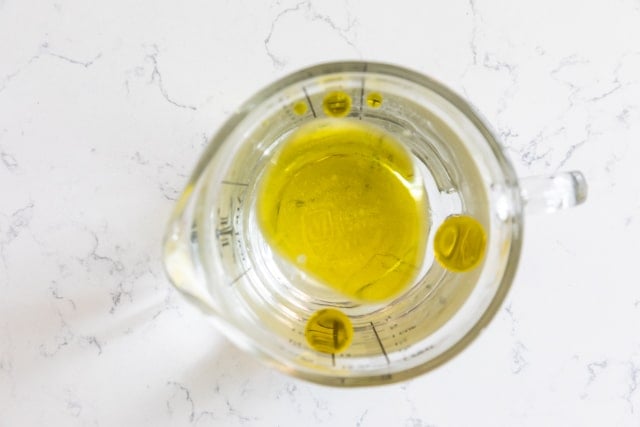
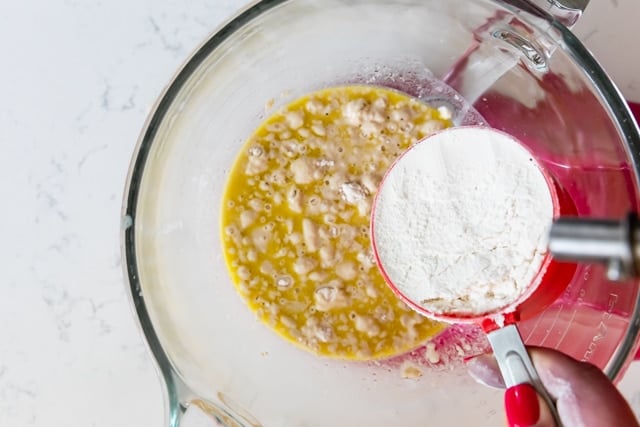
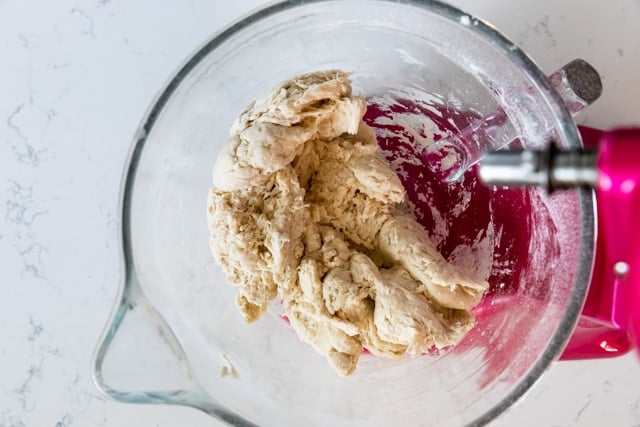
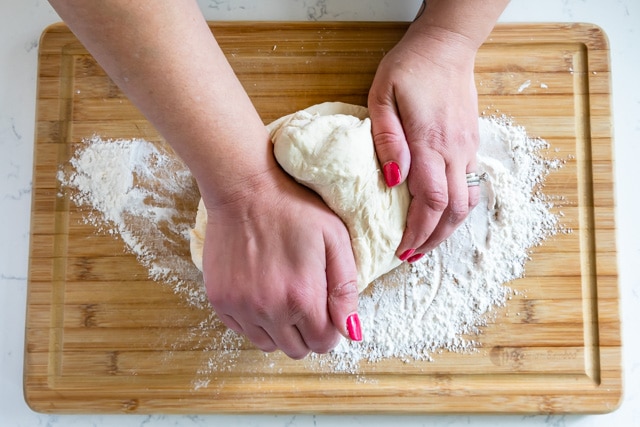
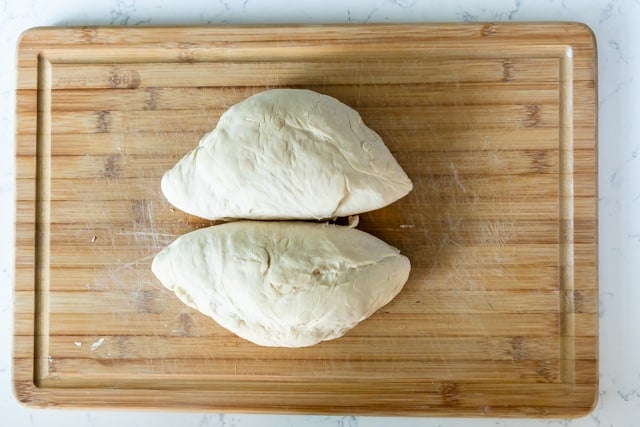
- Heat your water to between 120°-130°F. You need warm water to activate your yeast. I recommend using an instant read thermometer (this is my favorite) because it’ll tell you exactly when it’s hot.
- Add 1 cup of flour, yeast, and salt to a large mixing bowl and whisk. Once the water is hot, add the olive oil, then add the wet ingredients into the yeast mixture. Using the dough hook attachment, mix (while scraping the sides of the bowl) until all the wet ingredients are moistened.
- You’ll then add 2 more cups flour, mix with the dough hook until moistened, then add 2 more cups of flour, for a total of 5 cups. Run the mixer until the dough comes together. It will be only slightly tacky to the touch.
- Turn out the dough onto a lightly floured surface. Knead the dough until it’s elastic and forms into a ball. You’ll know it’s done kneading when it springs back when you press it with two fingers. Rest for 10 minutes.
- This recipe makes two loaves of crusty French Bread. After the 10 minutes resting time is up, divide the dough into two pieces.
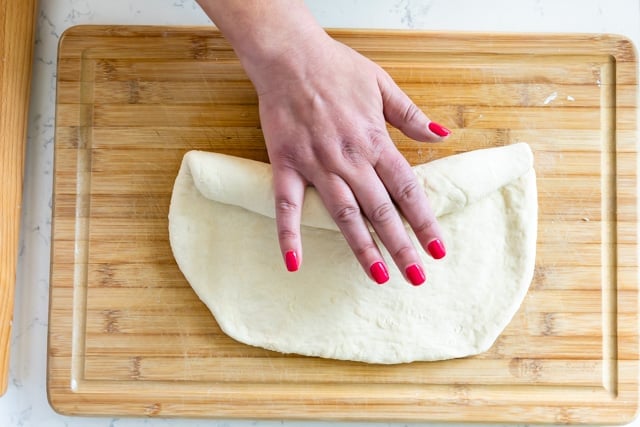
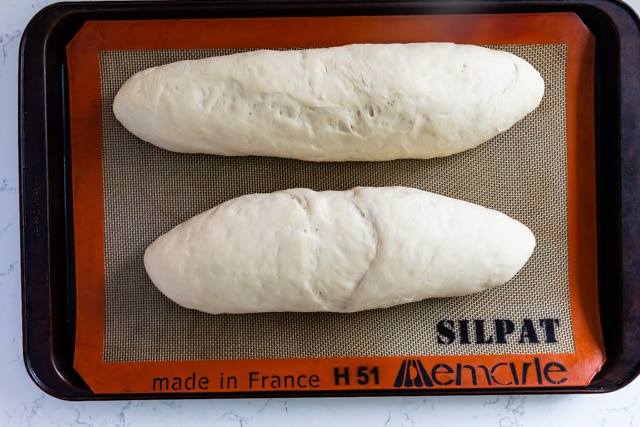
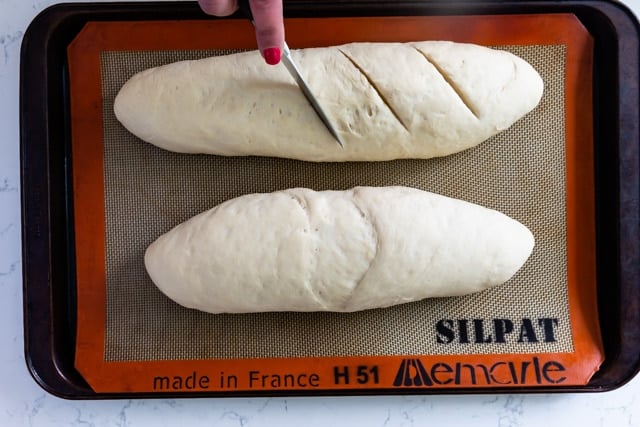
How to form French Bread
- Roll each out into a rectangle. Roll them up from the long side. Pinch the ends to form the loaf. Place on a greased cookie sheet or use a silicone baking mat on your baking sheet.
- Place in a warm area to rise until doubled, about 45 minutes. Be sure to preheat oven during this time.
- How to Score French Bread: Use a sharp knife to make shallow diagonal cuts (slits) in the dough. You can also use a razor blade or a lame (the official name for a French bread scorer). Scoring the bread allows steam to release during baking, eliminating cracking and allowing for expansion.
- Brush the top of each loaf with egg wash. I used an egg white but if you want to use a whole egg, you can, just beat it first.
- You’re going to bake the loaves for about 20-25 minutes, but if you want them nice and golden brown and crusty, make sure to re-brush them with egg-wash halfway through baking.
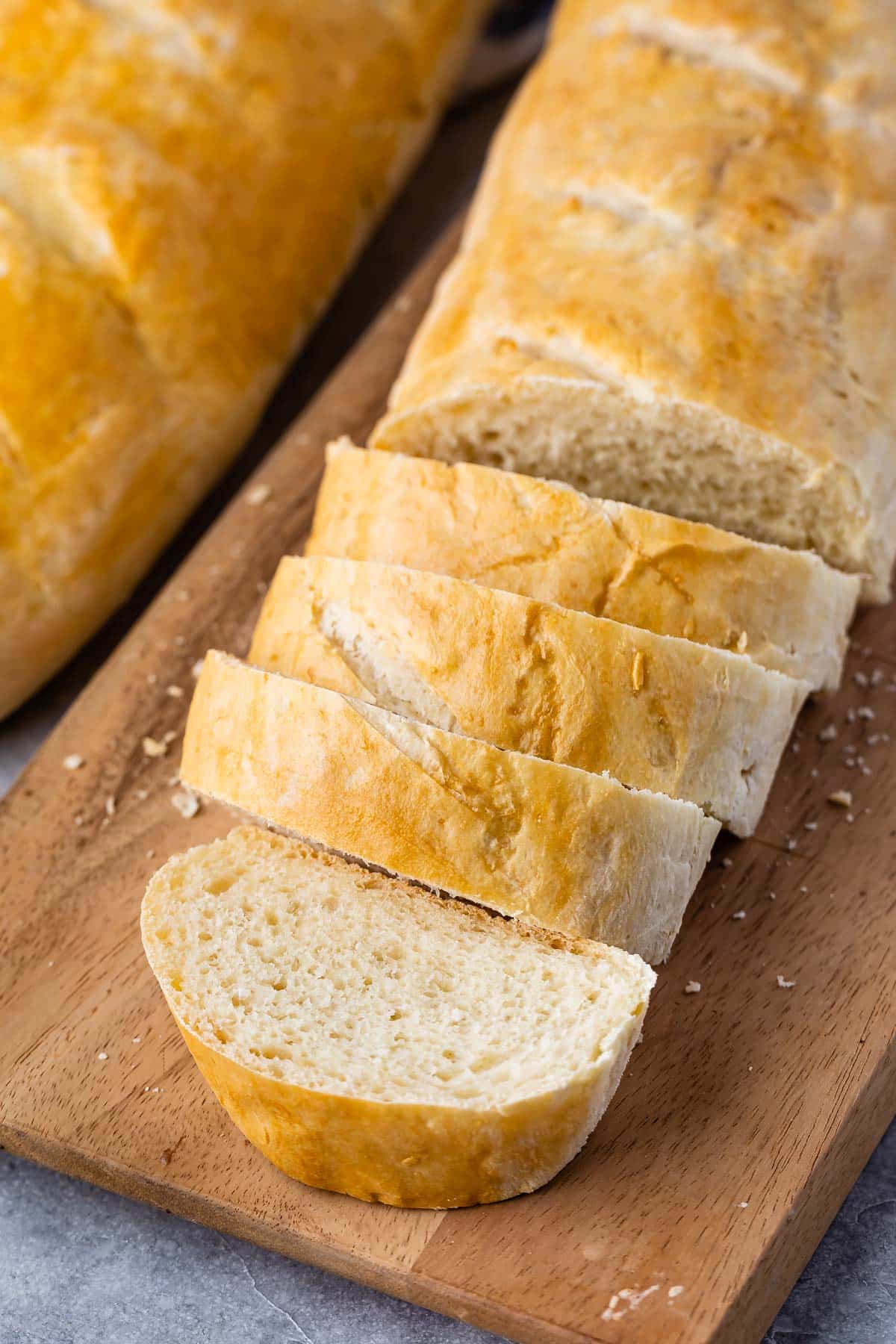
Tip From Dorothy
Expert Tips
- For a crusty golden loaf, do a second egg wash halfway through baking.
- You know your bread is done when it’s a beautiful golden color.
- How to Store French Bread: Store this in an airtight container or bag for up to 2 days. Because there are no preservatives in this bread it will get stale and go moldy after a couple of days.
- Can you Freeze French Bread? Yes! You can freeze the freshly baked loaf – just let it cool first then wrap it with plastic wrap and freeze for up to 2 months.
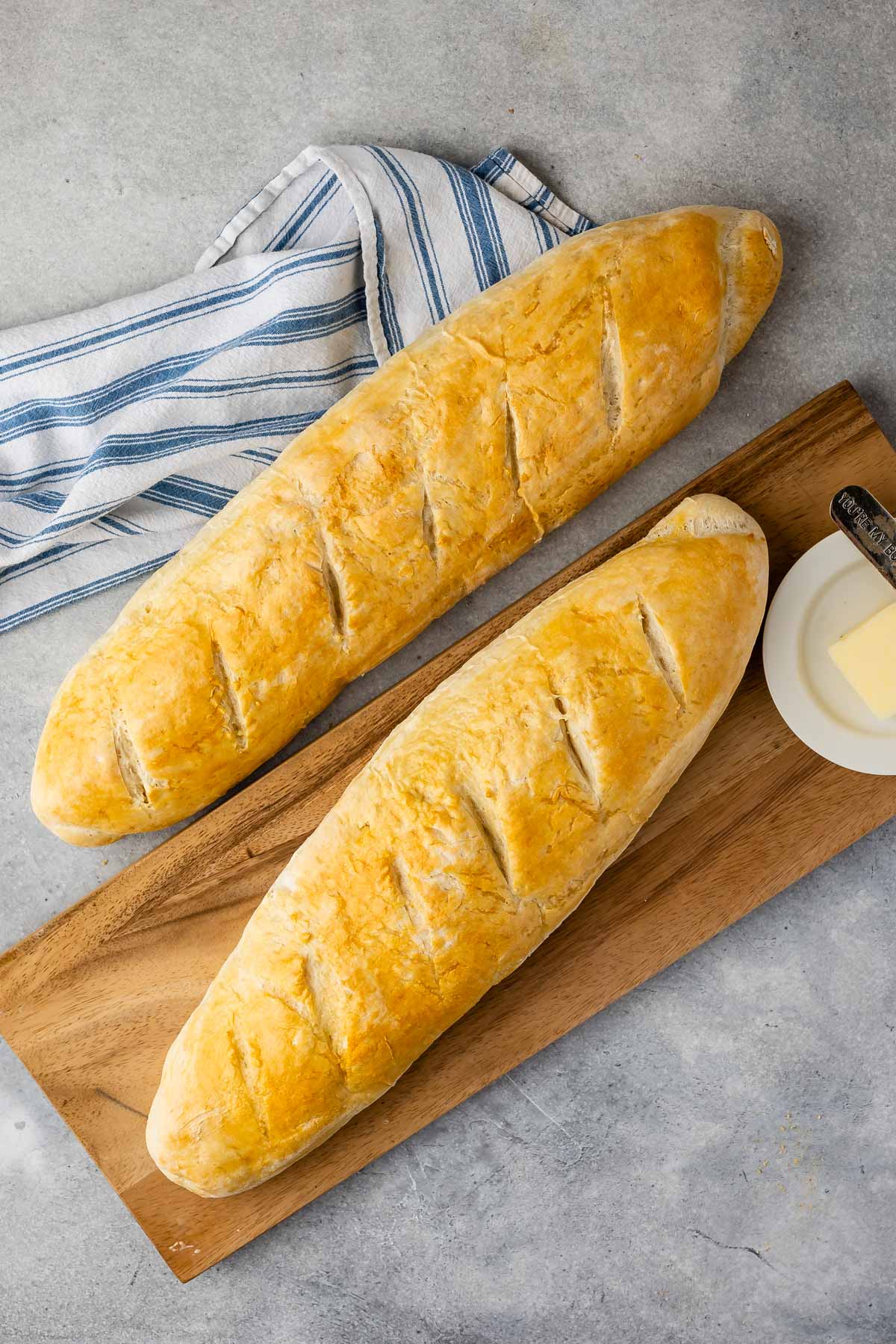
Homemade Bread FAQ
Yes you can – I’ve done that and it works just fine. You can also double it to make 4 loaves.
This recipe needs the instant yeast – any brand – and if you want to use active dry yeast you’ll need a different method/recipe. I haven’t tested this with active dry as of this writing.
Egg wash gives the bread it’s golden color. You can also use the steam method (involving ice water in the oven) but that is more complicated and can cause oven problems if you’re not experienced. I find egg is easier.
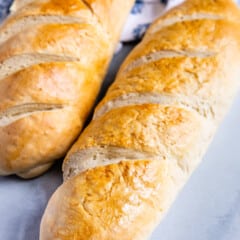
Easy French Bread Recipe
Recipe Video
Ingredients
- 4 ½ – 5 cups (558-620g) all-purpose flour divided
- 2 packets Fleischman’s Yeast Rapid Rise Yeast or any instant yeast (4 1/2 teaspoons)
- 2 teaspoons salt
- 1 ¾ cups (414ml) water
- 1 tablespoon olive oil
- 1 egg white
Instructions
- Add 1 cup of flour to the bowl of a stand mixer fitted with the dough hook. Add yeast and salt and whisk to combine.
- Place water in a heat-proof measuring cup. Heat for about one minute (maybe longer, it depends on your microwave) until water is between 120°-130°F. It’s best to check this with an instant-read thermometer, but if you don’t have one, think hot bath water. Add oil to water, then pour into dry ingredients.
- Run mixer with dough hook, scraping the sides of the bowl, just until the flour is all moistened. Add 2 more cups of flour, mix, then add an another 1 1/2 cups of flour and let the mixer run until the dough is thick and starts to come together, adding an additional 1/2 cup flour as needed. It won’t form a ball but will only be slightly sticky to the touch.
- Turn dough out onto a floured surface and knead until the dough forms a ball and is elastic and springs back when pressed with two fingers; cover and let rest 10 minutes.
- After 10 minutes, divide the dough into two equal pieces. Roll each piece of dough into an approximate 12×15-inch rectangle (no need to be exact) and roll it up from the long side. Pinch the ends to form the pointy ends of the loaf.
- Place loaves on a cookie sheet covered with a silicone baking mat or parchment paper. Cover and let rise until double in size, about 45 minutes.
- Preheat oven to 400°F.
- Uncover loaves and use a sharp knife to score 4-5 times on top to create the French bread look. Brush the dough lightly with egg wash.
- Bake for 20-25 minutes or until the loaves are golden and hard and sound hollow if knocked on. To make a browner and crunchier crust, as shown in the photos, do a second brushing with egg white after 15 minutes of baking.
- Cool slightly before serving, store in an airtight container for up to 3 days.
Recipe Notes
- Place water in the bowl of a stand mixer. Sprinkle in yeast; stir until dissolved. Add oil, salt and enough flour to make a soft dough, mixing with the dough hook. Knead on floured surface until smooth and elastic, about six to eight minutes. Place in greased bowl, turning to grease top. Cover; let rise in warm draft free place until doubled in size, about 30 to 45 minutes.
- Punch dough down. On floured surface, divide dough in half; roll to 15×10-inch ovals. Roll up from long ends to make loaves. Pinch seams and ends to seal; taper ends. Cover; let rise in warm draft free place until doubled in size, about 30 to 45 minutes. Bake as directed.
- For a crusty golden loaf, do a second egg wash halfway through baking.
- You know your bread is done when it’s a beautiful golden color.
- How to Store French Bread: Store this in an airtight container or bag for up to 2 days. Because there are no preservatives in this bread it will get stale and go moldy after a couple of days.
- Can you Freeze French Bread? Yes! You can freeze the freshly baked loaf – just let it cool first then wrap it with plastic wrap and freeze for up to 2 months.
Recipe Nutrition
Pair this with…
- Clam Chowder Soup
- Panera Copycat Apple Salad
- As a side dish for my spicy chicken dinner or zucchini boats!
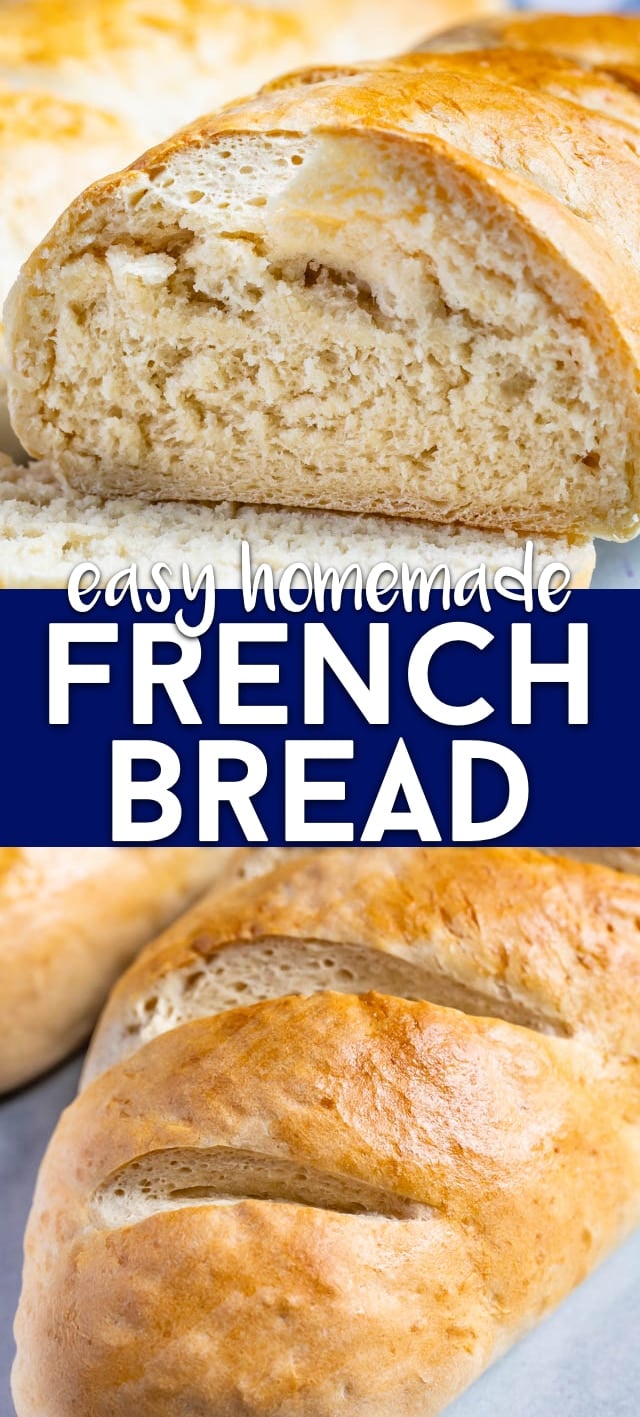
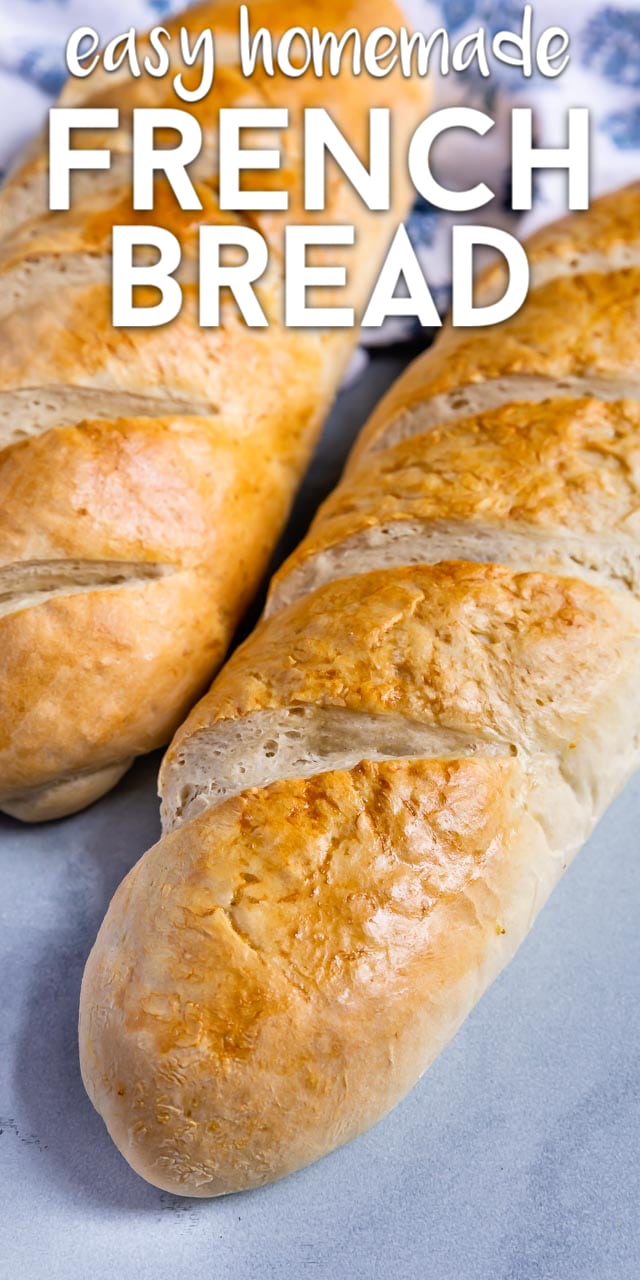

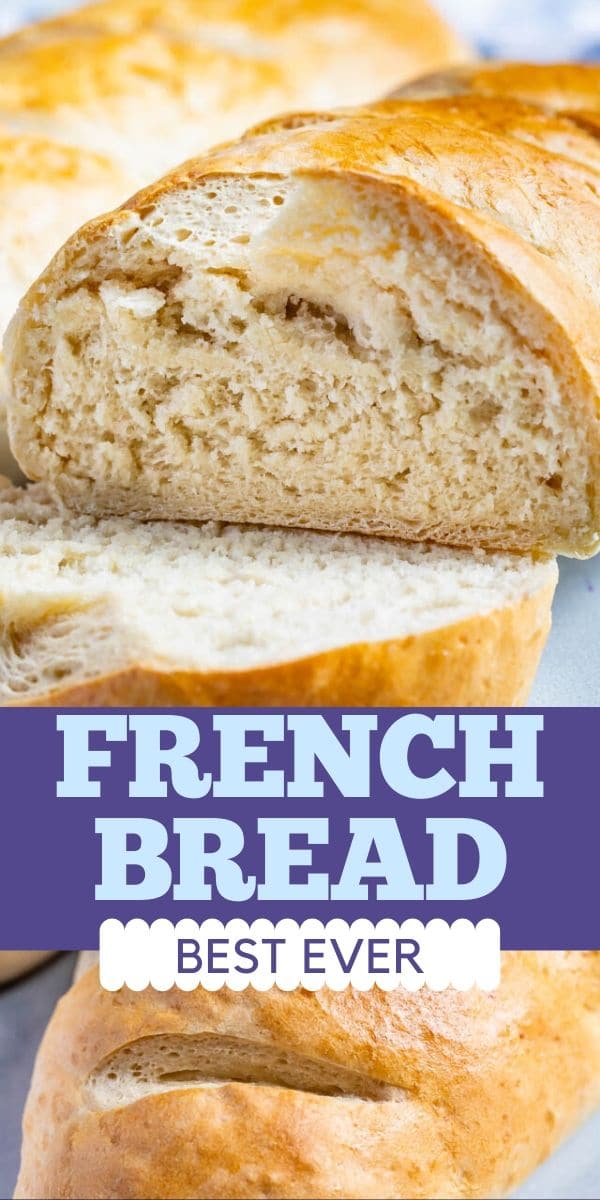
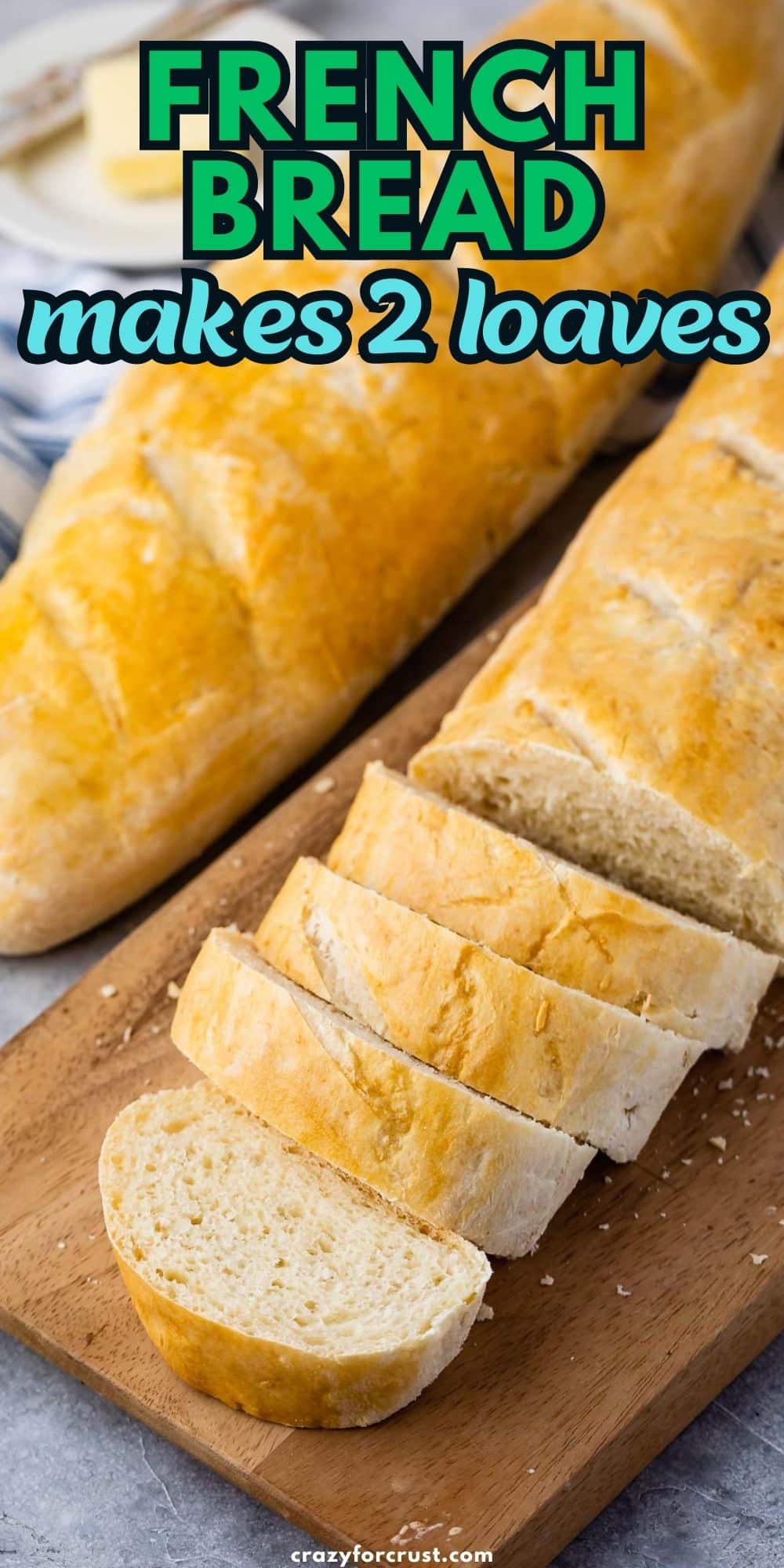
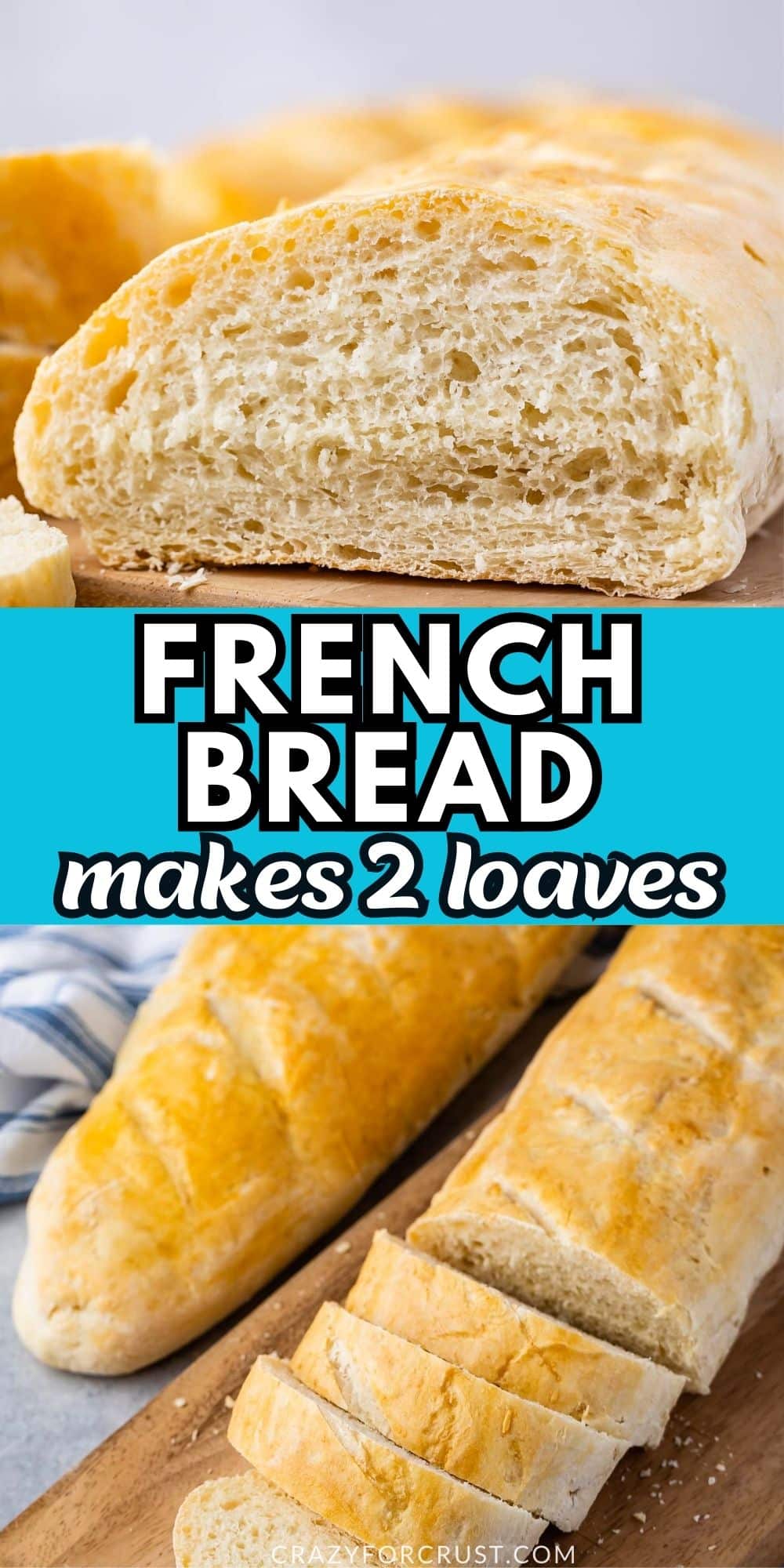
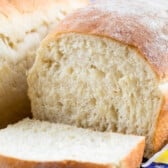
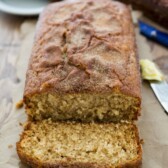
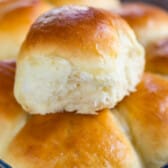
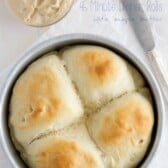
I don’t know what went wrong! I followed the receipt to the last detail. The dough did not rise in double the size. And when cooked it the center stayed doughy, not cooked through even though I left for extra longer baking time!
If your looking for a good book, I recommend the Jack Reacher series by Lee Child. Especially the book 61 hours. You don’t have to read them in order and they really keep you turning pages till the end.
Can I add rosemary to this recipe like your white bread ?
Delicious but… my loaves rose beautifully but when I scored them across the top and brushed with the egg wash, they flattened. What did I do wrong?
If bread falls after you score it, it’s because the bread is overproofed. The bubbles are too big and so when scored it collapses. They key is to either score it earlier and let it continue rising a bit, or to score & bake it earlier.
Hi, please the equivalent of the yeast in grams.
Made it was awesome. Thanks
Featured In
Rate This Recipe
Recipe Ratings without Comment